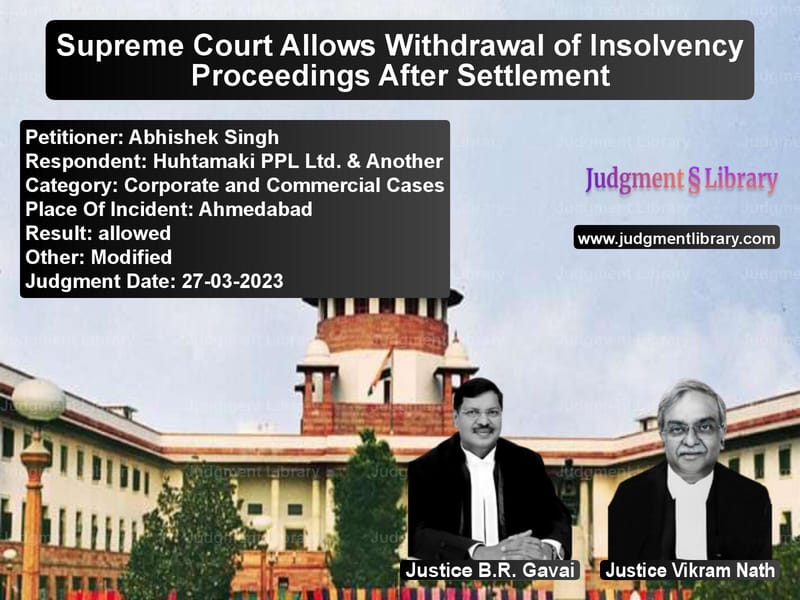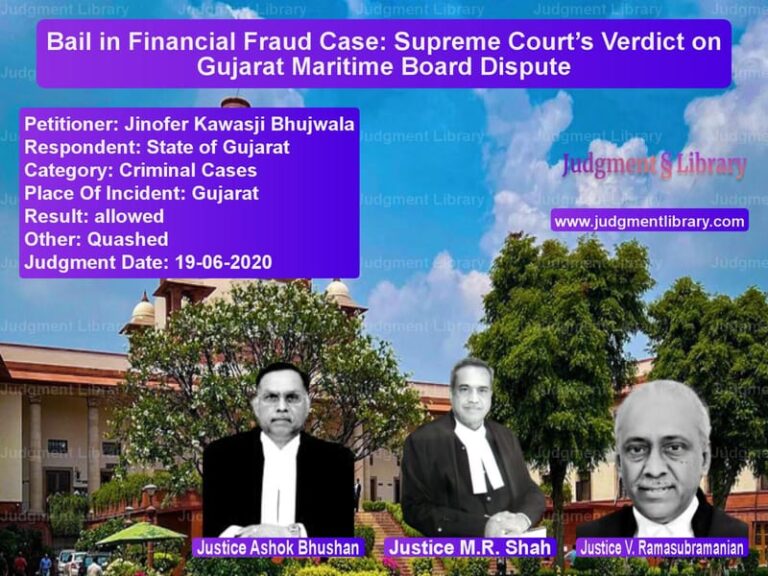Supreme Court Allows Withdrawal of Insolvency Proceedings After Settlement
The Supreme Court of India has ruled that insolvency proceedings under the Insolvency and Bankruptcy Code (IBC), 2016, can be withdrawn before the constitution of the Committee of Creditors (CoC) if the debtor and creditor settle their dispute. The judgment came in the case of Abhishek Singh vs. Huhtamaki PPL Ltd. & Anr., where the appellant challenged the rejection of his withdrawal application by the National Company Law Tribunal (NCLT).
Background of the Case
The case involves Manpasand Beverages Ltd., a fruit beverage manufacturing company with around 700 employees and a turnover of ₹984.96 crores in 2018-2019. The company owed ₹1.31 crores to Huhtamaki PPL Ltd., which supplied packaging material to the company.
Huhtamaki filed an insolvency petition under Section 9 of the IBC, and the NCLT admitted the petition on March 1, 2021. However, two days later, on March 3, 2021, Manpasand Beverages and Huhtamaki reached a settlement, under which Manpasand agreed to pay ₹95.72 lakhs. The entire settlement amount was paid by March 8, 2021.
On March 10, 2021, the Interim Resolution Professional (IRP) applied for withdrawal of insolvency proceedings under Section 12A of IBC, supported by Huhtamaki’s request for withdrawal. However, before the NCLT could decide, several creditors filed claims, leading the NCLT to reject the withdrawal request on April 13, 2021. The IRP then constituted the Committee of Creditors on April 15, 2021.
The appellant challenged the NCLT order before the Supreme Court, arguing that the proceedings should have been withdrawn since the settlement was reached before the CoC was formed.
Arguments by the Appellant (Abhishek Singh)
- The settlement was reached before the CoC was constituted, making the insolvency proceedings redundant.
- Section 12A of the IBC and Regulation 30A of the IBBI Regulations allow withdrawal before the CoC is formed.
- The NCLT had no authority to override Regulation 30A and should have permitted the withdrawal.
- Other creditors could pursue their claims independently but should not have been allowed to block the settlement.
Arguments by the Respondents (IRP and Other Creditors)
- The settlement was paid from the personal account of the suspended director, violating the moratorium under Section 14 of IBC.
- Several other creditors had filed claims, and withdrawal would unfairly impact them.
- The NCLT had discretion to reject the withdrawal request considering multiple creditors were involved.
Supreme Court’s Observations and Ruling
The Supreme Court ruled that the NCLT erred in rejecting the withdrawal application. It observed that:
- The settlement was reached and executed before the CoC was constituted, making insolvency proceedings unnecessary.
- The NCLT failed to follow the precedent set in Swiss Ribbons Pvt. Ltd. vs. Union of India (2019), where the Court allowed withdrawal before CoC formation.
- Section 12A and Regulation 30A clearly permit withdrawal before CoC formation, and the NCLT had no grounds to deny it.
- Other creditors still had independent legal remedies to claim their dues.
The Court held:
“Once the settlement is reached and fully executed before the constitution of the CoC, the application under Section 12A should be allowed without awaiting objections from other creditors.”
Final Judgment
The Supreme Court set aside the NCLT order and ruled:
- The insolvency proceedings against Manpasand Beverages Ltd. are withdrawn.
- The settlement between the operational creditor and the corporate debtor is valid and binding.
- Other creditors can pursue their claims separately as per the law.
- The NCLT must follow Regulation 30A in similar cases.
Implications of the Judgment
The ruling has significant implications:
- Strengthening the IBC Framework: Reaffirms that insolvency is not meant to be punitive but a tool for financial resolution.
- Encouraging Settlements: Promotes quick resolution of disputes and reduces the burden on insolvency tribunals.
- Protection of Debtors: Ensures that companies are not unnecessarily dragged into insolvency when settlements are reached early.
- Clarity for Creditors: Confirms that other creditors can still seek claims through alternative legal mechanisms.
Conclusion
The Supreme Court’s ruling in Abhishek Singh vs. Huhtamaki PPL Ltd. establishes a clear precedent for withdrawal of insolvency proceedings before the formation of CoC. It ensures that genuine settlements are honored and prevents misuse of insolvency laws to exert undue pressure on debtors. This decision is a crucial step in streamlining the insolvency resolution process in India.
Petitioner Name: Abhishek Singh.Respondent Name: Huhtamaki PPL Ltd. & Another.Judgment By: Justice B.R. Gavai, Justice Vikram Nath.Place Of Incident: Ahmedabad.Judgment Date: 27-03-2023.
Don’t miss out on the full details! Download the complete judgment in PDF format below and gain valuable insights instantly!
Download Judgment: abhishek-singh-vs-huhtamaki-ppl-ltd.-&-supreme-court-of-india-judgment-dated-27-03-2023.pdf
Directly Download Judgment: Directly download this Judgment
See all petitions in Bankruptcy and Insolvency
See all petitions in Corporate Compliance
See all petitions in unfair trade practices
See all petitions in Judgment by B R Gavai
See all petitions in Judgment by Vikram Nath
See all petitions in allowed
See all petitions in Modified
See all petitions in supreme court of India judgments March 2023
See all petitions in 2023 judgments
See all posts in Corporate and Commercial Cases Category
See all allowed petitions in Corporate and Commercial Cases Category
See all Dismissed petitions in Corporate and Commercial Cases Category
See all partially allowed petitions in Corporate and Commercial Cases Category







